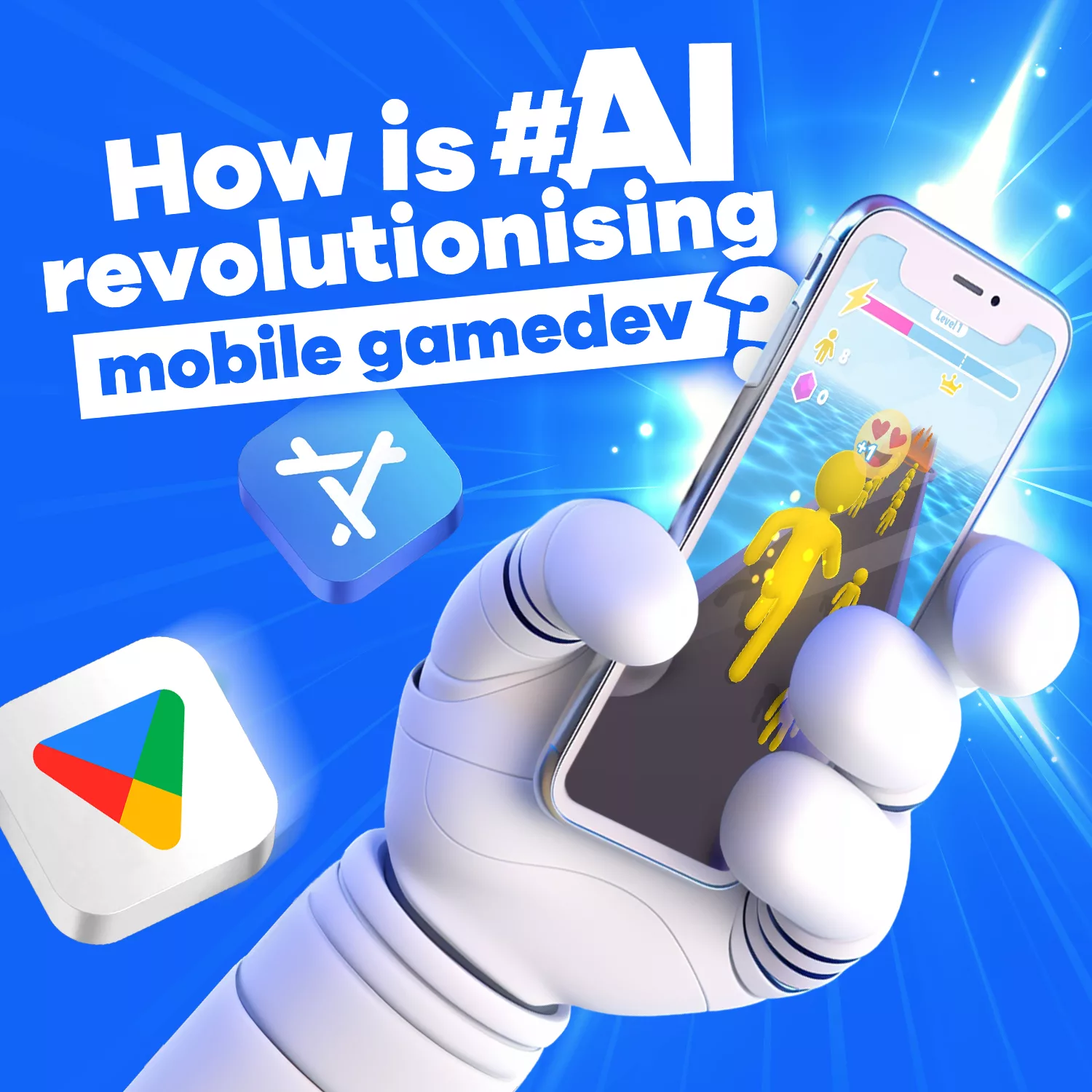
AI in Mobile Gaming: How Artificial Intelligence Is Changing Games
Related Articles
- How to Play the Game Basketball Legends 2020
- How to Play the Game Jump Doper: A Comprehensive Guide
- How to Play the Game Stickman Rope Hero: A Comprehensive Guide
- Level Up Your Future: Esport Scholarships And How To Secure Financial Support For Your Gaming Passion
- How to Conquer the Challenges of Vex 5: A Comprehensive Guide for Victory
Introduction
Join us as we explore AI in Mobile Gaming: How Artificial Intelligence Is Changing Games, packed with exciting updates
AI in Mobile Gaming: How Artificial Intelligence Is Changing Games

The world of mobile gaming has exploded in recent years, captivating millions with its accessibility and diverse offerings. But what truly sets these games apart is their increasing reliance on artificial intelligence (AI). From the intricate behavior of non-player characters (NPCs) to personalized recommendations and dynamic gameplay, AI is shaping the mobile gaming landscape in profound ways.
This article delves into the diverse ways AI is revolutionizing mobile gaming, exploring its impact on gameplay, user experience, and the future of the industry.
1. Enhancing Gameplay: From Smarter Opponents to Dynamic Environments
Gone are the days of predictable, repetitive AI opponents. Modern mobile games leverage AI to create more engaging and challenging experiences.
a) AI-Powered NPCs:
Imagine a game where your enemies aren’t just mindless bots following scripted patterns. AI-powered NPCs are capable of learning from your actions, adapting their strategies, and even exhibiting emotions. This makes encounters more dynamic and unpredictable, enhancing the thrill of victory and the sting of defeat.
For example, in games like Clash of Clans, AI-controlled opponents adapt their attack strategies based on your base layout and troop composition. This forces players to think strategically and constantly evolve their defenses, keeping the game fresh and engaging.
b) Adaptive Difficulty:
AI can dynamically adjust the difficulty level of a game based on your skill level. This ensures a smooth learning curve, preventing frustration for beginners while challenging experienced players.
In Asphalt 9: Legends, AI opponents adjust their driving styles and aggression based on your performance, providing a consistently challenging experience regardless of your skill level.

c) Dynamic Environments:
AI can create dynamic environments that react to player actions. In Minecraft, AI-powered mobs can hunt players in packs, making exploration more immersive and dangerous. Similarly, PUBG Mobile uses AI to populate the world with dynamic weather patterns and events, influencing gameplay and adding an element of surprise.
2. Personalizing the Experience: Tailoring Games to Individual Players
AI is transforming mobile gaming from a one-size-fits-all experience to a personalized journey tailored to individual preferences.
a) Personalized Content Recommendations:
AI algorithms analyze your gaming habits, preferences, and even demographics to suggest games, levels, and in-game items that align with your interests. This ensures a more enjoyable and relevant experience, preventing players from getting lost in a sea of irrelevant options.
Apps like Google Play Games and Apple Arcade utilize AI to recommend games based on your past purchases, playtime, and even your device’s specifications.
b) Adaptive Learning:
AI can track your progress and adapt the game’s difficulty and content to your learning pace. This ensures a smooth learning curve for new players and prevents experienced players from getting bored with repetitive content.
In Duolingo, AI adjusts the difficulty and pace of language lessons based on your performance, ensuring a personalized learning experience.
c) Dynamic Storytelling:
AI can create interactive narratives that change based on player choices. In Detroit: Become Human, AI-powered characters react to player decisions, leading to branching storylines and multiple endings. This creates a sense of agency and immerses players in the narrative.
3. Monetization and Engagement: Maximizing Revenue and Player Retention
AI plays a crucial role in maximizing revenue and player retention for mobile game developers.
a) Targeted Advertising:
AI analyzes player data to deliver highly targeted in-game advertising, maximizing the effectiveness of marketing campaigns and ensuring a more relevant experience for players.
b) Personalized Offers:
AI can analyze player spending habits and preferences to offer personalized in-game purchases, increasing the likelihood of conversion and maximizing revenue.
c) Player Retention Strategies:
AI can identify players at risk of churn and implement personalized retention strategies, such as targeted offers or exclusive content, to keep them engaged.
4. The Future of AI in Mobile Gaming: Exploring the Possibilities
The integration of AI in mobile gaming is still in its early stages, with countless possibilities waiting to be explored.
a) AI-Powered Game Design:
AI could be used to generate entire game levels, characters, and even storylines, freeing up developers to focus on creative aspects. This could lead to more diverse and innovative gaming experiences.
b) Advanced NPC Interaction:
AI could be used to create NPCs with even more sophisticated behaviors, emotions, and personalities, making them feel like real characters with whom players can form meaningful relationships.
c) Immersive VR/AR Experiences:
AI could be integrated with virtual reality (VR) and augmented reality (AR) technologies to create immersive and interactive gaming experiences, blurring the lines between the real and virtual worlds.
5. Ethical Considerations: Ensuring Responsible AI Integration
While AI offers significant benefits to mobile gaming, it’s crucial to address potential ethical concerns.
a) Bias and Fairness:
AI algorithms can perpetuate biases present in the data they are trained on. This can lead to unfair gameplay experiences, especially for marginalized groups. Developers must ensure that AI systems are designed and trained to be fair and inclusive.
b) Data Privacy:
AI relies heavily on player data, raising concerns about privacy. Developers must be transparent about data collection practices and ensure that player data is used responsibly and ethically.
c) Job Displacement:
As AI takes on more tasks traditionally performed by human developers, concerns about job displacement arise. Developers need to adapt to the evolving landscape and focus on creative roles that AI cannot replicate.
6. Conclusion: A New Era of Interactive Entertainment
AI is revolutionizing mobile gaming, transforming it from a passive entertainment medium to an interactive and personalized experience. From smarter opponents to dynamic environments and personalized recommendations, AI is enhancing gameplay, engaging players, and pushing the boundaries of what’s possible in mobile gaming.
While ethical considerations need to be addressed, the future of mobile gaming is bright, with AI poised to play a pivotal role in shaping the next generation of interactive entertainment.
Source:
https://www.gamesindustry.biz/articles/2023-01-19-how-ai-is-changing-the-mobile-gaming-landscape
Closure
Thank you for reading! Stay with us for more insights on AI in Mobile Gaming: How Artificial Intelligence Is Changing Games.
Make sure to follow us for more exciting news and reviews.
Feel free to share your experience with AI in Mobile Gaming: How Artificial Intelligence Is Changing Games in the comment section.
Keep visiting our website for the latest trends and reviews.


